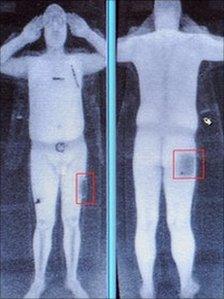Manchester Airport body scanners in all three terminals
- Published

Body scanners have been criticised for being an invasion of privacy
Body scanners will be installed at all three terminals at Manchester Airport following a year-long trial.
By the end of October the equipment will be introduced in all security areas.
The Equality and Human Rights Commission said it had some concerns the move would breach privacy laws.
However, airport bosses said most people now preferred the scanners to a full body pat-down.
Work to install the final body scanner at Terminal 3, which accommodates international and domestic flights, will begin later.
Not every passenger has to go through the body scanners. At first they go through a "Smartgate" which acts like a metal detector.
The passenger then either gets directed to the body scanner or to the exit. If someone refuses to go through then they cannot board their flight, an airport spokesman said.
Since the trial began in October 2009, more than 400,000 passengers have gone through the body scanners.
According to Manchester Airport, 95% of travellers prefer the scanners and queuing times have been radically reduced.
Governments around the world have been looking into the technology since the foiled bomb attempt on a Detroit plane on Christmas Day last year.
Religious complaints
It can take two minutes to carry out a pat-down, whereas walking through a body scanner takes 25 seconds, the airport said.
Earlier this year two Muslim women refused to go through Manchester's scanners on religious grounds.
Andrew Harrison, Manchester Airport's managing director, said: "We began trialling a body scanner in 2009 because one of the most regular complaints from our passengers was about being patted down at security.
"Body scanners could solve this but we also knew that the technology was controversial which is why we embarked on a trial.
"We fully respect that a small number of people have reservations about body scanners on privacy or medical grounds, but we have gone to great lengths to ensure the highest levels of privacy protection and expert studies have shown that the technology is safe."
Despite a report from a Columbia-based university calling for more research into body scanners and radiation, in September the UK's Health Protection Agency (HPA) asserted that the technology was medically safe because the exposure levels were so small.
The two Muslim women who refused to pass through the body scanners have since visited the airport to find out more about them, which has allayed their fears, Mr Harrison said.